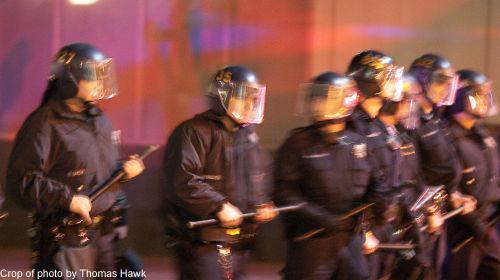
Body cameras are a hot topic these days in the wake of the Ferguson and Eric Garner controversies, as well as President Obama’s announcement that he will seek $75 million in funding for police body cameras and training. Body cameras are an important public policy issue – the devices have the potential to function as a powerful oversight mechanism for police in departments around the country, but also (as we explain in our 2013 white paper) raise serious privacy issues. It’s important that these knotty issues be worked out transparently, in public, through the democratic process.
So are police departments putting good policies in place? In October, I tried to find out. I called and emailed the twenty largest Police Departments in the country, as well as a random sampling of an additional ten departments that attended the Police Executive Research Forum (PERF) conference in September, 2013 on best practices in the use of body cameras. Specifically, I sought information on which departments are using body cameras and on whether the departments’ policies are readily available to the public. My aim was to use this information to analyze the relative merits of each policy.
Only five of these thirty departments sent me their policies. The remaining twenty-five cited various reasons for not doing so: one department told me that they couldn’t share their policy as it was still in draft form; four reported having no policy; and four required a more formalized public records request in order to access the policy. The remaining sixteen departments either responded stating categorical unwillingness to send their policy, or simply did not respond. It’s also worth mentioning that of the five policies that we did receive, only one was publicly available on the police department’s website.
Many departments are still struggling to figure out how to integrate the cameras into their work. Many, commendably, have reached out to ACLU affiliates and other community stakeholders for input into their policies. But for a department to seek to keep its policy on this new technology secret is unacceptable. Now more than ever, we the people have the right not only to see these policies, but to be certain that they do in fact exist. Transparency is the only way that the public can be sure that body cameras will be used as a check against the abuse of police power, as opposed to yet another tool to increase that power.
The policies that I did receive came from Albuquerque, Cincinnati, Las Vegas, Los Angeles, and Oakland. These policies seemed to generally follow the PERF report’s recommendations, which laid out specifics on when the camera should be turned on (at all times when responding to calls for service), on data retention, and on who should and should not be allowed to view the policy. A couple of the policies, however, were hazy on whether or not use of the cameras should be voluntary. Still others did not specify that the cameras should be on during all calls of duty. In other words, these policies seemed to provide insufficient guidelines for ensuring that the technology would both protect the public against police misconduct, and protect police against false accusations of abuse.
Body cameras are a new technology with the potential to implicate a range of civil rights, and we are all—citizens, legislators, and police departments alike—still working to determine how they can best fit into our society. While there is no model for a “perfect policy” yet in place, it’s clear that their successful deployment relies first and foremost on transparency. This requires both that strong and transparent policies exist, and that they be easily accessible to the public. And by accessible, I mean easily found on police department’s websites, not tucked away in lengthy transcripts of meeting minutes. This is the only way to ensure that body cameras will be the win-win that we hope they can be.



